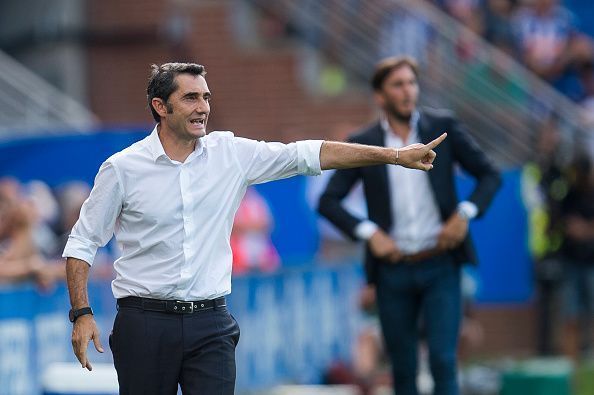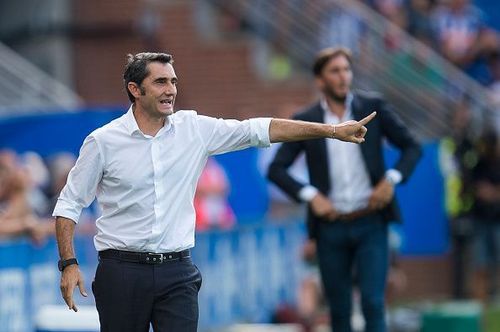
How Ernesto Valverde fixed and possibly ruined Barcelona

Juventus, Arsenal and AC Milan - these are the only three teams in over 100 years of football played across the five major European leagues that have gone a full season without a defeat in their season-tally (unless you want to count Preston North End winning the inaugural Football League competition in 1889). FC Barcelona, a club with the best player on the planet, is four games away from joining that elite company. A feat that some will say is far greater than winning the “treble”. After all the treble has been accomplished eight different times by European teams including Barcelona, who have achieved this honor twice.
And yet, there’s a certain section of the crowd that might be unhappy at the end of this season. Ask Barcelona fans about the current season and the criticism might be harsher. Of course, these fans have forgotten that just eight months ago Pique publically admitted that Real Madrid was a better team. This team had just sold one of the best players in the world in Neymar, lost Suarez to injury to start the season with and before the last-second pickup of Dembele, its marquee signing of the summer was Paulinho, who was playing in China. And it still, this Barca side won the domestic double.
For almost a decade now, Barcelona has been synonymous with frustrating and torturing oppositions with their incisive passing. The seeds of this now almost mythical philosophy was laid by Frank Rijkaard but nourished and raised by Pep Guardiola. Managers who were not disciples of the tiki-taka church did not last long at the club (looking at you Tata Martino).
Follow Barcelona vs Real Madrid Live with Sportskeeda
When Luis Enrique took over the Barcelona team that was in transition -- Puyol, Xavi and Iniesta were being phased out and new blood in the form of Neymar, Rakitic and Suarez was being incorporated -- he deliberately and smartly changed the tactics to a more counter-attacking style. Mind you, this iteration still retained most of the aspects of a typical Guardiola team, but they were happy to concede possession to certain teams.
What resulted was a treble in his first year in charge and a team that some might consider to be one of the best in the history of the game. But then Iniesta and Busquets started succumbing to father time, Dani Alves left the team under bizarre circumstances, and Neymar wanted to escape Messi’s “shadow” (which will sound hilarious in two years when he’ll be under Mbappe’s shadow).
Enter Valverde, who was handed an aging roster, a leaky defense – Enrique’s team over the three seasons conceded 31, 39 and 37 goals – and a 19-year old was a replacement for Neymar, who busted his tendon three games into the season.
So how did Valverde fix all those issues? Under Enrique, the general attacking philosophy was to let either Neymar or Messi terrorize defenders on one side of the field as Suarez and the other winger made runs into the box. If the initial onslaught was somehow coped with, the opposing defense would be so compact that the full backs will overload on the flanks to whip crosses into the box.
Once Valverde took over the team, he had the option to either play Dembele, who for all his talent is no Neymar (yet!) or Deulofeu (insert sad emoji here) in the Neymar spot. What he did was unorthodox and shrewd. Paulinho was tasked with the role to be the secondary target in the opposing penalty box, running in from midfield - a role which he filled beyond anybody’s wild expectation, as after 15 games into the season he had more goals than Cristiano Ronaldo! The attack was centered around Messi (and when you have the best player in the galaxy that’s never a bad strategy) as Iniesta was being phased out slowly.
To fix the leaky defense he dialed back the pressing which was ever present during the Guardiola and Enrique eras. Barcelona now has possession of the ball only 60.2% of the time, the lowest since 2009-10 season. They prioritize getting back in defensive shape than harassing the opponents to give the ball back. And it makes sense as most of their squad is older.
Busquets, who had everyone’s back and cleaned up for their mistakes, if the opponent did beat the trap, is a step slower now. Sitting back allows the duo of Busquets and Paulinho to shield the backline, recover the ball and spring into counterattacks. As a result, the shots on target that they have allowed has climbed down from 4.18 in 2016-17 season to 3.35 this season.
While all these changes fixed the holes left by Valverde’s predecessor, it opened up some new ones. With Neymar’s departure, Iniesta’s gradual decline, Dembele’s injury and the late arrival of Coutinho, on most nights it was left to the guy in the No. 10 jersey to do the heavy lifting on the offensive end.
And as great as Messi is, when he’s not ripping through the opposing defense, Barcelona look pretty mediocre. Guardiola’s team had a purpose everytime they got hold of the ball, but Valverde’s men pass the ball around in endless cycles till Messi decides to activate his Infinity Gauntlet.
The defensive identity that he built over the first half of the season is also wilting as the season draws to a close. His tactic of defending deep worked as long as the double pivot of Busquets and Paulinho were being played together. But thanks to being employed in Chinese Super League, unlike his compatriots, Paulinho’s season started in February and by the end of the year, he had already played a full season’s worth of football.
As his playing time dwindled over the next few weeks, his spot was filled with a rotating cast of Rakitic, Coutinho and Andre Gomes, a.k.a. players not renowned for their defensive acumen. So the idea of sitting back and keeping the opposition at bay backfired on certain occasions (*cough* 2nd leg against Roma *cough*).
As the Barca manager prepares his team for Real Madrid, a team that he has both humiliated and has been humiliated by in a span of eight months, there’s a weird feeling around this Barca team. More backup has arrived in the form of Coutinho’s winter transfer and Dembele’s return from injury. And one feels that given the hand he was dealt to start the season with, he has done more than a fine job.
He’s had some deer in the headlights moments but winning a domestic double -- a feat for which most of the clubs will saw their arms off -- in his first season in-charge of one of the biggest clubs in the world is a commendable feat. But, this is Barcelona. Winning trophies is not the only parameter you are judged on, it has to be paired up with a certain flair. He’s already fixed a lot of systemic flaws in the team, how he fixes the identity crisis will define the next few years of the Catalan club.